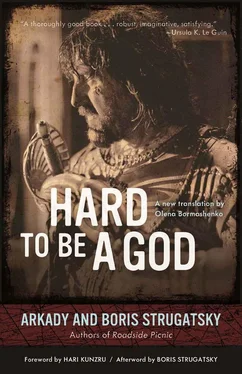Apparently, Doctor Budach was very hungry. However, he gently but firmly refused animal products and devoted his attention only to the salads and the tarts with jam. He drank a glass of the Estorian wine; his eyes brightened and a healthy glow appeared on his cheeks. Rumata couldn’t eat. Crimson torches crackled and smoked in front of his eyes, everything smelled of burnt meat, and there was a lump in his throat the size of a fist. So while he waited for his guest to eat his fill, he stood by the window, keeping the conversation polite, quiet, and unhurried, so as not to interfere with his guest’s chewing.
The city was gradually coming to life. People appeared on the street, voices became louder and louder, hammers were pounding and wood was cracking—pagan images were being knocked off the roofs and walls. A bald, fat shopkeeper was pushing a cart with a barrel, off to sell beer at the square for two coins a cup. The residents were adapting. In the entrance across the way, the little spy-bodyguard was picking his nose and chatting with the skinny mistress of the house. Then wagons filled all the way up to the second story drove by the windows. At first, Rumata didn’t understand what these wagons were, then he saw the blue and black arms and legs sticking out from beneath the burlap and hurriedly walked over to the table.
“The essence of man,” Budach said, chewing slowly, “lies in his astonishing ability to get used to anything. There’s nothing in nature that man could not learn to live with. Neither horse nor dog nor mouse has this property. Probably God, as he was creating man, guessed the torments he was condemning him to and gave him an enormous reserve of strength and patience. It is difficult to say whether this is good or bad. If man didn’t have such patience and endurance, all good people would have long since perished, and only the wicked and soulless would be left in this world. On the other hand, the habit of enduring and adapting turns people into dumb beasts, who differ from the animals in nothing except anatomy, and who only exceed them in helplessness. And each new day gives rise to a new horror of evil and violence.”
Rumata looked over at Kira. She sat across from Budach and listened without looking away, propping up her cheek on her little fist. Her eyes were sad; she was clearly very sorry for humankind. “You’re probably right, honorable Budach,” said Rumata. “But take me, for example. Here I am, a simple noble don.” Budach’s high forehead creased, his eyes opened wide with surprise and merriment. “I have tremendous love for learned men—that is, gentility of the soul. And I cannot figure out why you, the keepers and only holders of high knowledge, are so hopelessly passive. Why do you meekly allow yourself to be despised, thrown in jails, burned at the stake? Why do you separate the meaning of your life, the pursuit of knowledge—from the practical requirements of life, the struggle against evil?”
Budach pushed away the empty plate of tarts. “You ask strange questions, Don Rumata,” he said. “It’s funny, I was asked the same questions by Don Gug, the chamberlain of our duke. Are you acquainted with him? I thought so. The struggle against evil! But what is evil? Everyone is free to understand this in his own way. For us scholars, evil is in ignorance, but the church teaches that ignorance is a blessing and that all evil comes from knowledge. For the plowman evil is taxes and drought, and for the bread-seller droughts are good. For a slave, evil is a drunk and cruel master; for a craftsman, a greedy moneylender. So what is this evil against which we must struggle, Don Rumata?” He looked sadly at his listeners. “Evil is ineradicable. No man is able to decrease its quantity in the world. He can improve his own fate somewhat, but it is always at the expense of the fate of others. And there will always be kings, some more cruel and some less, and barons, some more violent and some less, and there will always be the ignorant masses, who admire their oppressors and loathe their liberators. And it’s all because a slave has a much better understanding of his master, however brutal, than his liberator, for each slave can easily imagine himself in his master’s place, but few can imagine themselves in the place of a selfless liberator. That’s how people are, Don Rumata, and that’s how our world is.”
“The world is constantly changing, Doctor Budach,” said Rumata. “We know of a time when there were no kings.”
“The world cannot keep changing forever,” Budach disagreed, “for nothing lasts forever, even change. We don’t know the laws of perfection, but perfection will be achieved sooner or later. Consider, for example, the order of our society. How pleasing to the eye is this precise, geometrically correct system! At the bottom are the peasants and artisans, above them is the gentry, then comes the clergy, and then, finally, the king. What careful planning, what stability, what harmonious order! Why would we want to change this polished crystal, made by the hands of the jeweler in the sky? No structure is more stable than the pyramid—any knowledgeable architect will tell you that.” He raised a lecturing finger. “Grain spilled from a sack doesn’t settle in an even layer, but forms a so-called conical pyramid. Each seed clings to the next, in an effort not to roll down. So it is with humanity. If it wants to be an entity of its own, people must cling to one another, inevitably forming a pyramid.”
“Do you sincerely consider this world perfect?” Rumata asked with surprise. “After meeting Don Reba, after prison…”
“My young friend, yes, of course! There’s much I don’t like in the world, much I would like to be different. But what can one do? Perfection looks different in the eyes of a higher power than in mine. There is no sense in a tree lamenting that it cannot move, though it would probably be glad to flee from the lumberjack’s ax.”
“And what if you could change the divine decrees?”
“Only a higher power is capable of this.”
“But still, imagine that you’re God…”
Budach laughed. “If I could imagine myself as God, I’d become him!”
“Well, what if you had the chance to advise God?”
“You have a rich imagination,” Budach said with pleasure. “That’s good! Are you literate? Wonderful! I would enjoy working with you.”
“You flatter me… Still, what advice would you give to the Almighty? What, in your opinion, should the Almighty do, in order for you to say, ‘Now the world is good and kind’?”
Budach, smiling approvingly, leaned back in his chair and folded his hands on his stomach. Kira was looking at him eagerly. “All right,” he said, “if you wish. I’d tell the Almighty: ‘Creator, I don’t know your plans. Maybe you never intended to make people kind and happy. Then start wishing it! It would be so easy to achieve. Give people plenty of bread, meat, and wine, give them clothing and shelter. Let hunger and need disappear, and with them, all that divides people would be gone too.’”
“Is that it?” Rumata asked.
“You think that is not enough?”
Rumata shook his head. “God would answer you: ‘This would not benefit man. For the strong of your world would take from the weak that which I have given them, and the weak would still remain poor.’”
“I would ask God to shield the weak. ‘Enlighten the cruel princes,’ I would say.”
“Cruelty is power. Having lost their cruelty, the princes would lose their power, and other cruel men would replace them.”
Budach stopped smiling. “Punish the cruel,” he said firmly, “so that it would become unseemly for the strong to be cruel to the weak.”
“Man is born weak. He becomes strong when there’s no one stronger around him. When the cruel of the strong will be punished, their place will be taken by the strongest of the weak. Who will also be cruel. Then everyone will have to be chastised, and this I do not desire.”
Читать дальше












